Key takeaways:
- Children’s storytelling reflects their creativity and emotional intelligence, showcasing their ability to process experiences and feelings.
- Learning from mistakes fosters resilience and problem-solving skills, transforming setbacks into opportunities for growth.
- Mistakes in storytelling can lead to unexpected creativity and deeper character understanding, enriching narratives and engaging audiences.
- Embracing errors allows children to redefine concepts like bravery and friendship, encouraging a mindset of adaptability and joy in learning.
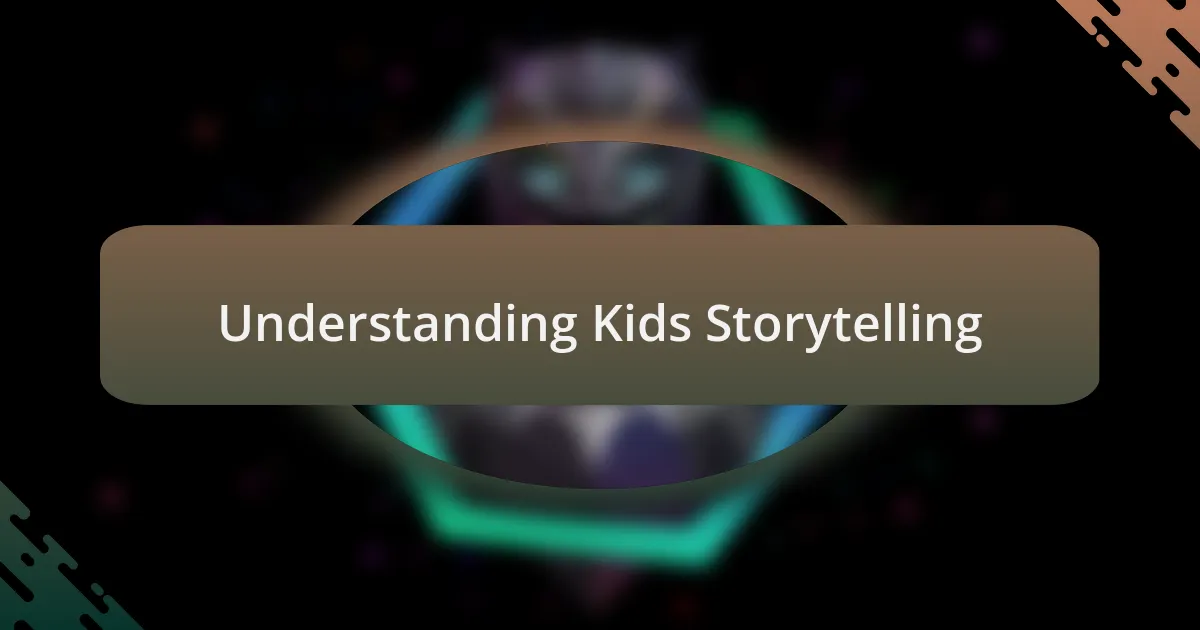
Understanding Kids Storytelling
Kids storytelling is a fascinating window into a child’s mind. When my daughter first narrated her favorite fairy tale, I was struck by how she infused her own experiences into the story, twisting the narrative to reflect her imaginative world. It made me realize that storytelling is not just about the words; it’s about fostering creativity and connection.
Have you ever noticed how a child’s storytelling can spiral from a simple idea into an elaborate adventure? One afternoon, my son started with a single sentence about a dragon but ended up weaving a complex tale that involved a brave princess, a lost treasure, and a mischievous talking cat. This spontaneity in kids’ storytelling reveals their understanding of narrative structure and character development, even if they’re not yet familiar with those terms.
Listening to children tell stories answers many questions for me about their lives and emotions. There was a moment when my niece shared a tale about a lonely little bird; through her simple words, I felt her own struggles with making friends. It dawned on me that storytelling isn’t just a creative outlet for children; it’s a vital tool for expressing their feelings and building emotional intelligence. Isn’t it incredible how a story can open doors to understanding a child’s inner world?
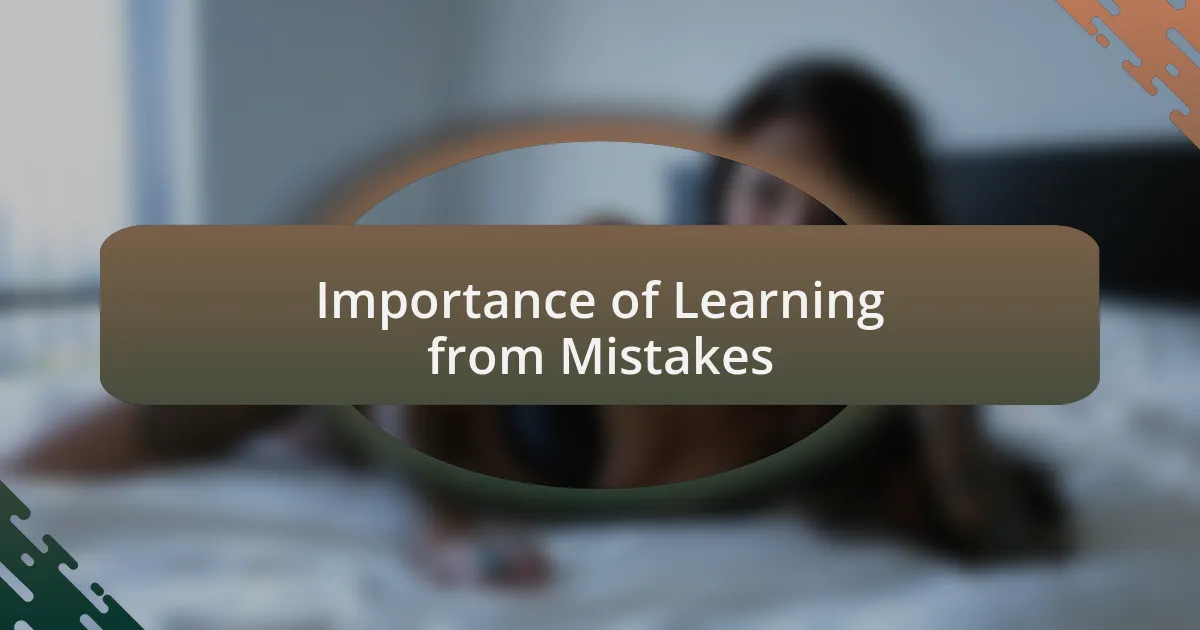
Importance of Learning from Mistakes
Learning from mistakes can be incredibly valuable for children’s growth. I remember when my daughter stumbled through her first school presentation, fumbling words and mixing up her main points. Instead of feeling defeated, she embraced the experience, laughing about it later and vowing to practice more. This moment taught her that mistakes aren’t the end; they’re an essential part of the learning journey.
Mistakes can also be excellent teachers of resilience. I recall my son trying to build a simple model airplane, only to watch it crash to the ground multiple times. Each failure sparked frustration, but we took time to analyze what went wrong together. The next attempt was successful, and his joy was palpable! This showed him that persistence pays off and that overcoming challenges strengthens not just skills but confidence.
Even the process of reflecting on mistakes can bring about profound personal insights. I often ask my children how they feel after encountering a setback. They’ve learned to articulate their emotions better, transforming disappointments into opportunities for growth. Isn’t it empowering for kids to realize they have the ability to navigate and learn from their missteps? This mindset not only fosters stronger problem-solving skills but also cultivates an adaptable outlook on life.
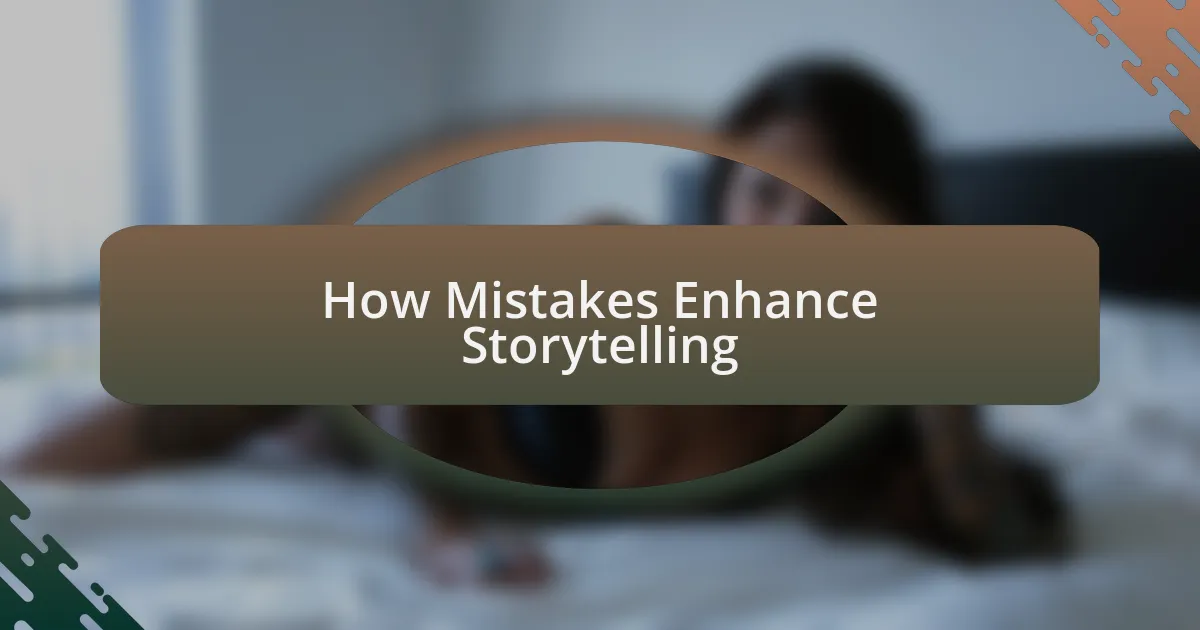
How Mistakes Enhance Storytelling
Mistakes in storytelling often lead to unexpected discoveries. I remember a time my kid flipped the script of a beloved fairy tale, misplacing characters and altering key events. Instead of sticking to the original plot, she created a unique storyline that sparked wild laughter and genuine intrigue among her friends. This taught me that narrative errors can become the building blocks of creativity, encouraging children to explore new directions and think outside the box.
When we embrace mistakes in storytelling, we also invite vulnerability and authenticity. I’ve seen my children stumble over words while sharing their tales, revealing their true emotions in that moment of uncertainty. When my daughter got tongue-tied sharing a spooky ghost story, her giggle broke the tension, making the audience more connected and engaged. How relatable is that? Those honest moments remind us that storytelling isn’t just about perfection; it’s about genuine connection and shared experiences.
Reflecting on our storytelling missteps can be a rich source of valuable lessons. After my son mixed up the plot lines in his story, we talked about why each character’s journey matters and how their mistakes shaped who they are. This conversation ignited a deeper understanding of character development, making it clear that flaws lead to growth and relatability. Isn’t it interesting how the missteps not only enhance the narrative but also enrich our understanding of ourselves and the world around us?
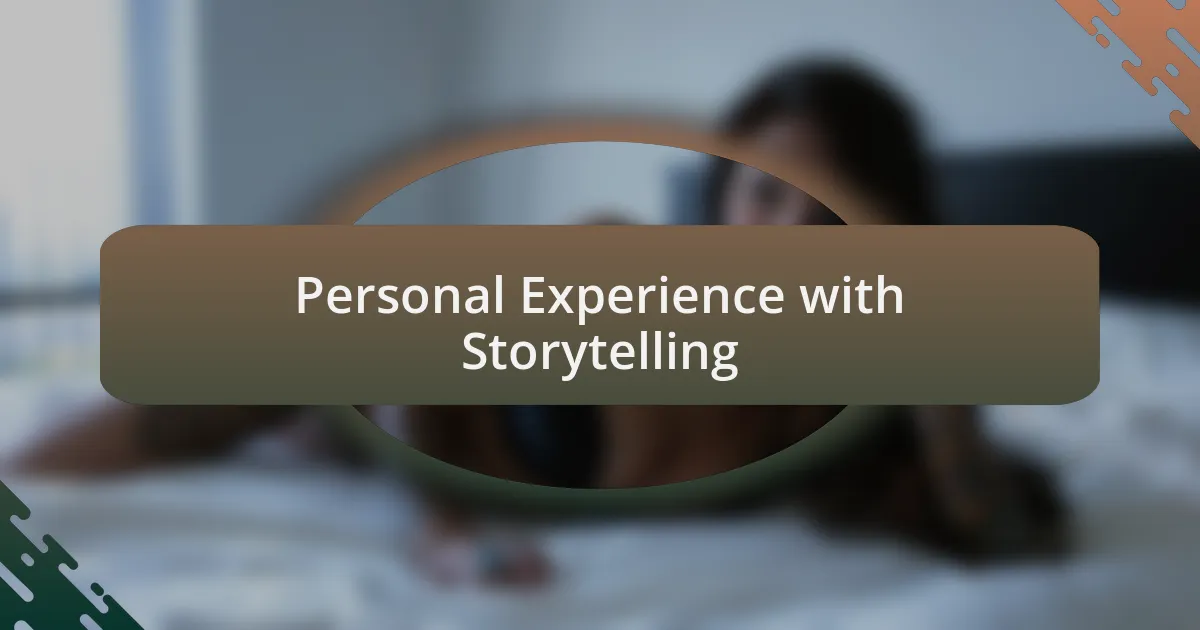
Personal Experience with Storytelling
I’ve always believed that storytelling opens a window to self-discovery. One afternoon, my daughter attempted to narrate her favorite adventure story but accidentally flipped the protagonist’s characteristics. Instead of being courageous, he was scared stiff! Watching her process this mistake was eye-opening. She said, “But maybe that’s what makes him brave!” That shift in perspective showcased her ability to redefine bravery, reminding me that storytelling is as much about understanding ourselves as it is about the characters we create.
During another storytelling session, my son started a tale about a dragon. He paused, grappling with words, and suddenly blurted out a nonsensical name for the creature: “Sizzlepop.” We shared laughter, and he confidently embraced that silly name, explaining how it made the dragon special. It struck me then: humor in storytelling isn’t just accidental—it’s an essential ingredient. Isn’t it fascinating how a simple mistake can transform a mundane plot into a memorable moment?
I’ve learned that relaying our storytelling blunders helps cultivate resilience in children. When my youngest mispronounced key words in a story about friendship, we took a moment to focus on what real friendship means, using her slip-ups as teachable moments. Watching her absorb those ideas reinforced my belief that every stumble is an opportunity. How often are our mistakes guiding us toward richer meanings in life?
A Kid’s Perspective on Mistakes
Mistakes, in a kid’s world, can feel like the end of the line. I remember the day my daughter mixed up her words while excitingly describing a rainy day adventure. She said, “The puddles were gigantic like oceans!” Instead of correction, her friends squealed with delight, turning her blunder into an epic quest. It made me wonder—how often do we overlook the magic in our slip-ups?
For my son, every mistake is merely a stepping stone to something greater. When he miscalculated the number of crayons needed for his art project, he decided to create a new character named “Colorless,” who magically mixed all the shades. This creativity stems from seeing mistakes not as failures, but as springboards for imagination. Doesn’t that illustrate the beauty of a child’s perspective on mistakes?
Furthermore, I’ve seen that kids often view mistakes as a part of their adventure rather than a setback. I recall watching my youngest stumble over the word “adventure” during her storytelling. Rather than be discouraged, she giggled, exclaiming, “Oops! It’s an adventure with a twist!” In that moment, I realized that the joy in learning comes from embracing errors. Isn’t it refreshing to learn how to spin mistakes into something fun and unique?
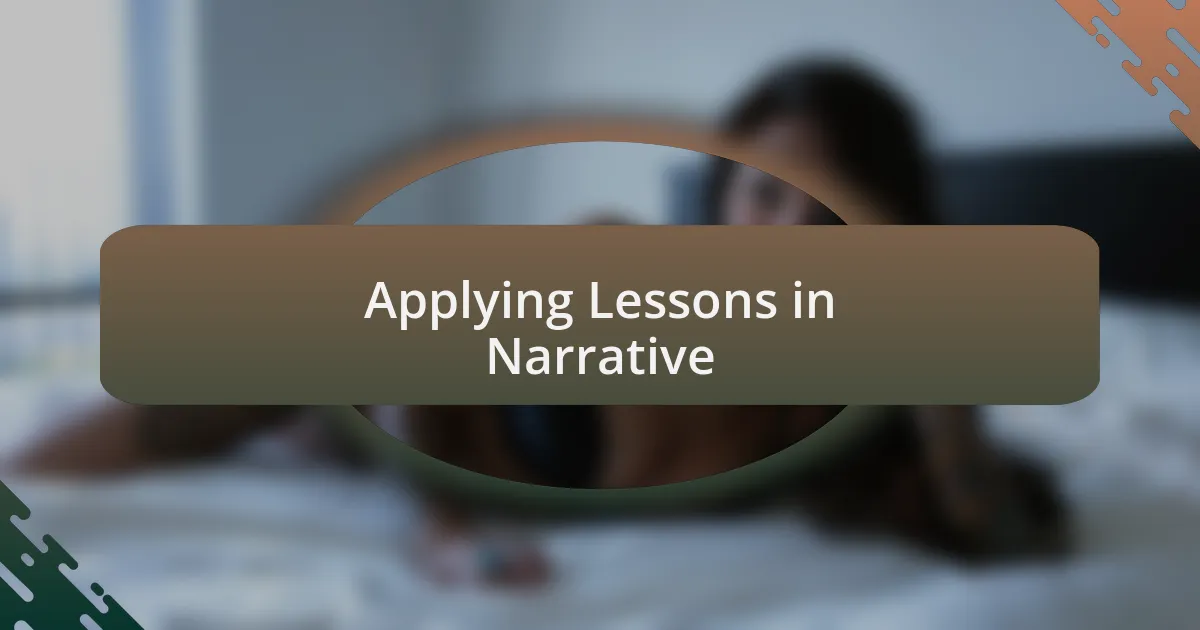
Applying Lessons in Narrative
Incorporating lessons from our mistakes into storytelling can transform a narrative in remarkable ways. I recall a time when my son attempted to write a story about a dragon who scared off the clouds. He was disheartened when his first draft didn’t quite capture the excitement he felt. Instead of giving up, he decided to have the dragon learn to collaborate with the clouds instead of scaring them, which turned his tale into a beautiful lesson on friendship and teamwork. Isn’t it fascinating how a single setback can spark creativity?
When crafting stories, I often encourage children to think of their characters’ mistakes as pivotal moments. For instance, during a storytelling session, a young girl shared a tale about a clumsy rabbit who forgot where he buried his favorite carrot. Instead of simply ensuing a comical chase, she wove in a moment of reflection where the rabbit learns the importance of remembering and sharing with friends. This not only made the story lively but also delivered a deeper message about responsibility. Doesn’t it make you rethink how we perceive our characters’ errors?
I’ve seen firsthand the power of vivid imagery that mistakes can bring to a narrative. I remember my daughter proudly presenting her story about a princess who accidentally spilled paint on her castle while crafting decorations. Rather than apologize, she turned it into a stunning rainbow castle that delighted the entire kingdom. This turn of events not only showcased the importance of resilience but also added a pinch of whimsy that kept her audience engaged. How often do we forget that mistakes can lead to unforgettable stories?